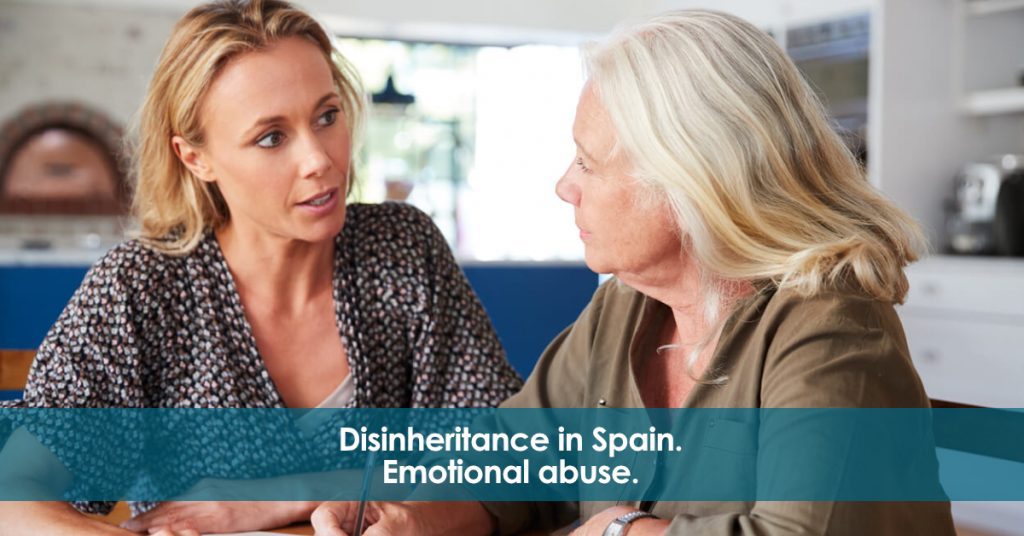In today’s article we would like to analyse a recent Supreme Court ruling on a topic that, unfortunately, is always relevant. The disinheritance in Spain. In particular, if it’s possible for parents to exclude their children from their will, preventing them from receiving the reserved share to which they are entitled to by law. And also, if it’s possible to disinherit a child due to the lack of relationship with his or her parents due to emotional abuse.
Reserved portion system in Spain and surrounding countries.
In Spain and other countries around us such as France or Belgium, a large portion of the inheritance assets is “reserved” for certain heirs. In other words, individuals are not free to dispose of their assets as they see fit. The portion of the deceased’s assets that, by law, is reserved to the “forced heirs” is known as the “legítima” or “hereditary reserve”. In Spain, the hereditary reserve of the children is 2/3 of the inheritance.
This system contrasts sharply with the freedom that exists in countries such as the UK. Where an adult can leave his or her assets to the person of his or her choice (whether or not this person is a child, partner, close relative, etc.).
Disinheritance in Spain: Causes to disinherit the children in the Spanish Civil Code.
For a parent to be able to disinherit a child in Spain, it is necessary that one of the causes foreseen in the Spanish Civil Code is present. The specific causes to disinherit children are regulated in Art. 853, which reads as follows:
“The following shall also be fair grounds for disinheriting children and descendants, in addition to those indicated in Article 756 under numbers 2, 3, 5 and 6:
– (1) Having denied, without legitimate reason, maintenance to the parent or ascendant who disinherits him/her.
– 2. Having mistreated him/her physically or seriously insulted him/her in word”.
Spanish Supreme Court Case Law: Emotional abuse and disinheritance.
The causes of disinheritance provided for in the second section (mistreatment and serious insult) have traditionally been understood as aggressions or acts of physical violence. However, since 2014, the Spanish Supreme Court has also included emotional abuse within this category. The main problem with the ruling that opened the door to disinherit for emotional abuse is that it was very vague and unspecific when describing the facts. It simply stated that the children “emotionally abandoned” their father during the last 7 years of his life, showing no interest or contact with him at any time, et. But not much more detail was given. The question is: Does the absence of relationship constitute emotional abuse?.
Sentence 419/2022: The absence of a relationship does not justify disinheriting.
The judgment of May 24th, 2022 sheds some light on this issue. On one hand, it confirms once again that emotional abuse can indeed constitute a cause for disinheritance. But at the same time, it makes it clear that the absence of a relationship between parents and children does not automatically qualify as “emotional abuse”. It is necessary to study the specific circumstances of each case. For emotional abuse to be appreciated, it is necessary that:
-. The absence of a relationship between the deceased and the heirs is exclusively attributable to the heirs in question.
-. Once the specific circumstances of the case have been analysed, it must be proved that this absence of relationship has caused emotional damage to the testator.
Conclusions.
The disinheritance in Spain is a complex issue. The lack of relationship between parents and children can be a reason for disinheritance, but it will depend on the specific circumstances of each case. It is therefore necessary to carry out a detailed study of each situation. At White Baos Lawyers we are experts in Family Law, Wills and Inheritance Law. Do not hesitate to contact us and we will offer you expert legal advice on these and other legal matters.
The information provided in this article is not intended to be legal advice, but merely conveys information relating to legal issues.
Carlos Baos (Lawyer)
White & Baos.
Tel: +34 966 426 185
E-mail: info@white-baos.com
White & Baos 2023 – All Rights Reserved.
